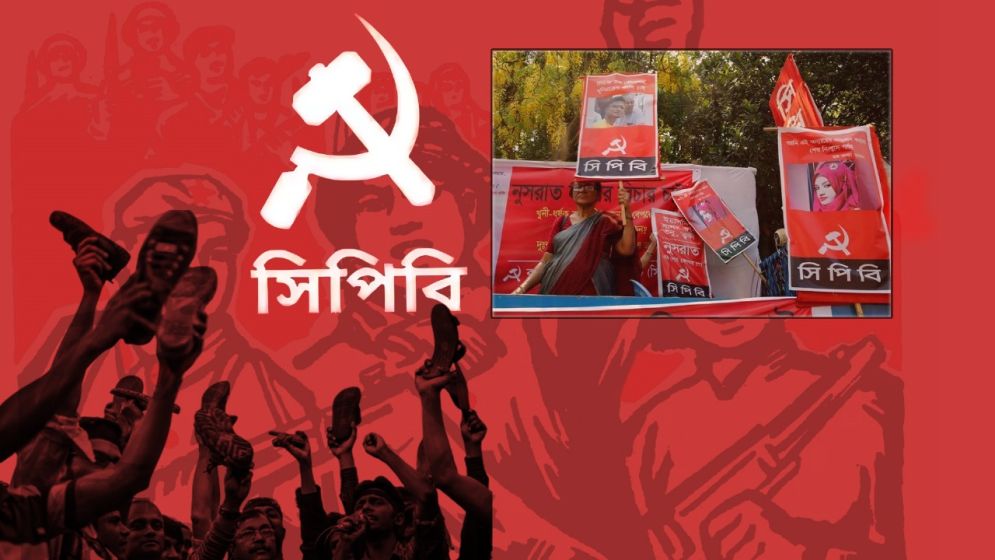Does the red flag still fly? Inside CPB’s political paradox

In recent weeks, the Communist Party of Bangladesh (CPB) has been busy proving a point.
Its members have taken to social media with a steady stream of archival footage, decades-old placards, grainy photos from street protests–each post a carefully chosen artifact from the party’s long history of resistance.
Their message is clear: We’ve always been against the regime. We’ve marched. We’ve resisted. We’ve paid the price.
But one has to ask: who is this performance for?
It’s not as though CPB suddenly developed a political conscience–it has existed for decades on the margins, holding its ground against both state repression and ideological dilution.
So why this sudden urge to convince, to clarify, to remind? Who is the intended audience–ideological drifters who switch allegiances with every shift in political wind? Twitter revolutionaries with no organizational roots? Or perhaps, worse still, the very centrist elite whose indifference has helped render the left politically invisible?
Let’s be blunt: CPB owes no one an explanation–least of all to those who never risked anything for their politics. Yet here they are, mounting a retroactive defense of their revolutionary bona fides to a public that thrives on selective memory and shallow moral posturing.
This isn’t just unnecessary–it’s dangerous.
CPB is not some upstart NGO in search of a donor. It is not a party born of election-time convenience or a PR stunt disguised as resistance. It has walked a harder, lonelier path: one that rejects the patronage politics of the Awami League and the reactionary opportunism of the BNP-Jamaat alliance.
And for that, it pays a steep price–exclusion, misrepresentation, and the double-edged scorn of both camps.
Within the AL orbit, CPB is smeared as “Lalbodor”--a traitor painted red. Meanwhile, from the far-left echo chambers and ex-revolutionaries who now tweet their activism, CPB gets branded as an “Amati”--a soft, compromised, pseudo-leftist group supposedly co-opted by the ruling party.
The contradiction should be obvious. You can’t be both the government’s enemy and its puppet. Unless, of course, the real sin isn’t betrayal–it’s independence.
-68500d36d29d6.png)
Who really fears CPB’s
legacy?
In Bangladesh’s calcified political arena, where every party is expected to pick a side–either orbiting around Sheikh Hasina’s Awami League or falling into the reactionary arms of the BNP-Jamaat alliance–CPB’s refusal to play the game is seen as heresy.
When it stands with workers and students against the state, it's attacked as subversive. When it refuses to lend legitimacy to reactionary coalitions, it’s labeled pro-regime.
This is the price of ideological consistency.
CPB is caught in a double bind: damned if it resists, damned if it refuses to collude. And now, under pressure from both ends, it appears to be second-guessing itself–trying to out-argue critics who have no interest in facts, no memory of the past, and no appetite for nuance.
This defensive posture must end. The Communist Party of Bangladesh cannot afford to waste time auditioning for respect in a political culture addicted to short-term spectacle and tribal loyalties.
Its relevance lies not in how loudly it can defend its past–but in how boldly it can shape the future.
If the left is to survive in this hostile political terrain, it must stop looking for validation from those who benefit from its marginalization. CPB’s strength has always come from standing alone. It would do well to remember that.
But the most insidious attacks on the CPB today aren’t coming from its traditional adversaries. They’re coming from within–from expelled former members now posing as whistleblowers while parroting the very narratives once used to silence them.
They are saboteurs, serving interests far removed from anything resembling revolutionary politics.
Ask yourself: who profits from this internal disarray? Who bankrolls these turncoats as they tear down a party they once saluted? The answer, unfortunately, is hiding in plain sight.
The CPB has something few others in Bangladesh’s political arena can claim: it fought in the Liberation War. While others fled, collaborated, or stayed conveniently silent, CPB cadres–alongside NAP and the Chhatra Union’s guerrilla units–took up arms.
It earned, not inherited, its place in the nation's origin story. And that’s precisely the problem.
-68500d7aec455.png)
CPB’s greatest weakness
In a political culture where loyalty is for sale and history is rewritten by the victor, CPB’s stubborn fidelity to the ideals of 1971 poses a unique threat.
Unlike dynastic parties that wave the flag of liberation when convenient–or invoke it to justify corruption, repression, or cronyism–the CPB never traded on its wartime credentials.
It simply lived them. That moral consistency makes it dangerous.
So the campaign to delegitimize CPB is more about erasing what it represents: a party that refuses to be co-opted, a lineage that challenges the ruling consensus.
Consider, for a moment, who isn’t asked to explain themselves. Jamaat-e-Islami–a party complicit in the most heinous war crimes of 1971–has walked in and out of parliamentary chambers with the blessing of both major coalitions.
Its leaders dine with Awami League emissaries in backchannel meetings and strike electoral deals with BNP operatives. Where is the national outrage? Where is the accountability?
More pointedly: why do those who called Sheikh Hasina “Qaumi Janani,” who received land grants, regulatory favors, and unrestricted access to state resources, remain untouchable? Why are their allegiances never interrogated?
And yet, it’s CPB–the party without ministries, without corporate sponsors, without media propaganda machines–that must constantly justify its existence.
The mobs don’t gather outside the gated homes of tycoons who bankroll election campaigns. They don’t storm the offices of NGOs or religious foundations that issued flowery endorsements of the regime.
Instead, they attack a party that has no parliamentary presence, no patronage network, and no profit motive–only principles.
What does that tell you?
It tells you that CPB remains a threat not because of its size, but because of its defiance. Because in a political landscape overrun by transaction, it insists on transformation.
And that is something both the ruling elite and the so-called opposition would rather see buried.
To be clear, the Communist Party of Bangladesh is not without fault. Like any organization rooted in ideology rather than power games, it has made costly strategic missteps–misjudging public sentiment, misreading the room, or simply failing to organize when it mattered most.
But these errors were never about personal enrichment or the pursuit of office. They were miscalculations born of principle rather than opportunism. And CPB has paid dearly for them.
The more urgent threat, however, isn’t external. It’s internal.
-68500da16b747.jpeg)
The enemy within
Inside the party, a dangerous rigidity is taking hold.
What began as healthy debate over the party’s position in the July movement and its stance toward the ruling Awami League has curdled into factionalism. On one side, hardliners push for an ideologically pure but politically impotent posture.
On the other, pragmatists advocate broader alliances but struggle to articulate the boundaries of compromise. What’s missing is not conviction–but dialogue.
This internal drift is far more corrosive than any smear from the outside. Dogmatism cloaked as discipline is not a sign of strength. It’s the slow unraveling of collective purpose.
History offers a brutal cautionary tale. The Iranian Tudeh Party, once a major force against the Shah, joined forces with Islamist revolutionaries only to be betrayed, purged, and erased when power changed hands.
Their slogans outlived them. Their courage did not save them. Betrayal often wears a familiar face.
The lesson here is vigilance. CPB must defend itself not only from state violence or ideological rivals, but from the slow rot of internal arrogance and disunity.
Let’s be blunt: CPB does not need to flood timelines with grainy protest photos or recycled rally posters to validate its legacy. That legacy is already written–in the trenches of the Liberation War, in the crackdowns it survived, in the movements it led when others stayed silent.
Social media can’t confer that kind of legitimacy–and it certainly can’t take it away.
The real task now is not narrative management. It’s political reconstruction.
CPB must do what it once did best: organize, educate, mobilize. Not in the comment sections, but on the factory floors, in the fields, on the campuses, and in the streets.
It must rebuild trust where it matters most–on the ground. It must forge alliances without diluting principles. It must resolve its internal rifts not through purges or posturing, but through political clarity and renewed strategy.
Above all, it must abandon the anxiety of irrelevance. Relevance is not something granted by the media, or Twitter, or ex-comrades turned critics. It is earned, over time, through discipline, struggle, and presence.
CPB does not owe explanations to trolls, turncoats, or power brokers. It owes results to the workers, farmers, students, and citizens who still believe, stubbornly, that a revolutionary Bangladesh remains possible.
And that belief–that stubborn, radical hope–is still worth organizing for.
—-
Siam Sarwer Jamil is a PhD candidate in the Department of Political Science at the University of Delhi. He can be reached at [email protected].

